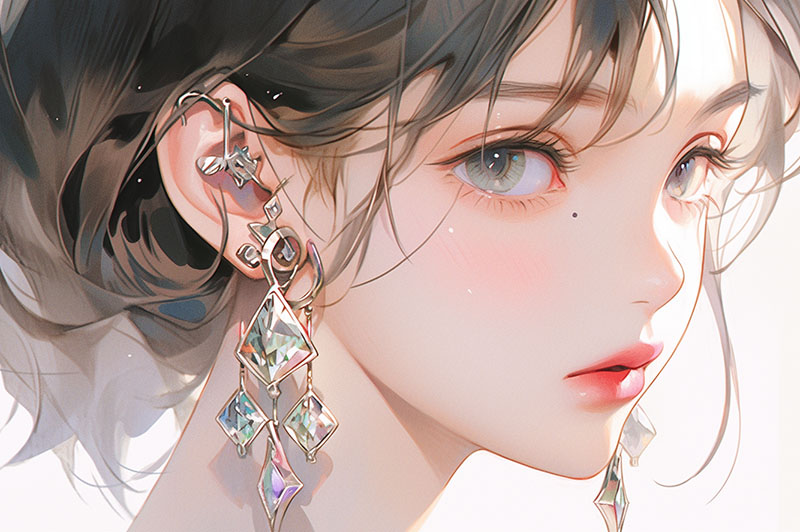This post may include affiliate links to products we think you'll find useful. We may earn a small commission if you buy through these links. Read our affiliate disclosure.
What is Diamond?
At their core, diamonds are crystalline forms of carbon, but calling them just that would be a disservice to their grandeur. They’re born deep within the Earth’s mantle, under conditions that are almost incomprehensible—extreme pressure and heat that would obliterate most substances. Over the course of millions, if not billions of years, volcanic activity can thrust them closer to the Earth’s surface. From there, they’re extracted to be cut, polished, and finally turned into the sparkling stones you see in jewelry stores.
But diamonds are more than just pretty ornaments or even investment assets. They play a role in various industries, from cutting tools to electronics, thanks to their unparalleled hardness. And let’s not forget their cultural and symbolic importance. Whether signifying eternal love or embodying the pinnacle of luxury and wealth, diamonds carry a weight of meaning that few other stones can claim. In essence, diamonds are a marvel of both nature and culture, embodying a blend of beauty, utility, and symbolism that’s rare to find in any other object.
The history of Diamond as the April birthstone
The tradition of birthstones traces back to ancient times, with some roots even linking to the biblical era. Originally, the concept was tied to the twelve gemstones on the breastplate of Aaron, a high priest in biblical times, and these gemstones eventually got associated with the zodiac signs. Over time, this evolved into the modern birthstone calendar, where each month gets its own gemstone.
Now, diamonds landed in April, and while there’s no definitive “this is why” answer, there are some compelling theories. One is that the qualities of a diamond, like clarity and strength, are symbolic of the freshness of spring, which is in full bloom in April. You’re shedding the old and murky, both in weather and, metaphorically, in life, and the diamond’s clear, pure form resonates with that vibe of renewal.
Another angle is more metaphysical. Diamonds are often associated with enhancing relationships and increasing inner strength. Considering that April is a time of year when many people and cultures celebrate renewal and rebirth—think Easter and various spring festivals—the idea of a stone that embodies new beginnings and eternal qualities fits in really well.
Last but not least, don’t underestimate the commercial angle. Diamonds are a big deal in the jewelry world, and claiming a whole birth month certainly hasn’t hurt their popularity or market value. This makes diamonds a go-to gift for April birthdays, anniversaries, and any other celebrations falling in this month, driving up demand even more.
So, while there’s no single reason why diamonds are the birthstone for April, it’s probably a mix of historical, symbolic, and commercial factors that have secured their spot. If you’re born in April, the diamond as your birthstone implies you’re as timeless, valuable, and multifaceted as the gem itself!
The symbolism of Diamond
1. Eternal love and commitment
You know how diamonds have that “forever” vibe? Well, that’s because they’re pretty much the epitome of durability and longevity. When you’re giving someone a diamond, you’re not just handing them a sparkly rock; you’re giving them a symbol that screams, “My love for you is as enduring as this stone!” Diamonds have been the go-to gem for engagement and wedding rings for ages, and it’s easy to see why. They’re pretty much unbreakable under normal conditions, which makes them the perfect metaphor for the unbreakable bond between two people in love. This everlasting aspect ties directly into the concept of commitment. Just as a diamond withstands pressure and heat without crumbling, the idea is that your commitment to each other will do the same, surviving life’s ups and downs.
2. Purity and innocence
Diamonds are like that friend who’s an open book—what you see is what you get. Their transparent, flawless nature is basically a metaphor for purity and innocence. In various cultures and religious texts, diamonds often signify these virtues, representing clarity of soul and thought. Think about how diamonds start—deep underground, formed under immense pressure. Yet, they emerge as these pure, crystal-clear beauties. When you give someone a diamond you’re saying, “Here’s to our pure emotions and the genuine nature of our relationship.” The diamond becomes a physical representation of an untainted beginning or an aspiration to maintain purity in intention and action.
3. Wealth and abundance
If you’ve got a diamond, people notice—trust me. Owning one of these sparkly gems sends a strong message about your success and prosperity. Throughout history, diamonds have been associated with wealth, showing up in royal crowns and treasury vaults. Their high value and rarity make them a symbol of exclusivity and luxury. And it’s not just about flaunting what you’ve got; diamonds have often been used as investment pieces, almost like gold. When you own or wear a diamond, you’re broadcasting that you’re doing well for yourself, or at least that you appreciate the finer things in life. It’s not just about material abundance either; it can extend to a wealth of experiences or emotional richness.
4. Strength and invincibility
Last but not least, diamonds are one of the hardest natural substances known to humankind. These gems are born from extreme conditions—deep in the Earth, under enormous pressure and heat. This is why they symbolize resilience and unyielding strength. Owning or wearing a diamond can make you feel like a superhero with an invisible shield. The diamond tells a story of triumph over adversity. It says, “I can withstand anything life throws at me and come out shining.”
How to use and care for Diamond
When it comes to using and caring for diamonds, you’re dealing with one of the toughest substances on Earth, but that doesn’t mean you can just throw caution to the wind.
Wearing a diamond lends not only sparkle but also a sense of timeless elegance to your look. Whether it’s an engagement ring or a simple pendant, diamonds are versatile enough to elevate any outfit.
You might think that because diamonds are so hard, they’re also invincible. Not quite. While they resist scratches better than any other gemstone, they can still suffer from smudges, dirt, and even oils from your skin. Regular cleaning is your friend here. A gentle soak in warm water with a mild detergent does wonders. You can also use a soft-bristled toothbrush to get into those hard-to-reach crevices. Avoid harsh chemicals or ultrasonic cleaners, especially if your diamond has been treated or has inclusions, as these can be sensitive to strong cleaning solutions.
Storage is another aspect you can’t ignore. Even though diamonds are incredibly hard, they can scratch other gemstones and even other diamonds. When you’re not wearing your diamond jewelry, place it in a separate pouch or a lined jewelry box to keep it from getting into scuffles with your other pieces.
So, while diamonds are hardy and multi-purpose, treating them with a bit of TLC ensures they’ll keep their sparkle and value for years, if not generations, to come.
Final thoughts
Diamonds are a marvel of nature, formed deep within the Earth’s mantle under extreme conditions, and they serve multiple purposes in our lives.
From being the ultimate symbol of love and commitment to representing purity and innocence, diamonds carry an emotional and cultural heft that few other stones can match. They’re not just limited to the realm of jewelry; their unparalleled hardness makes them valuable in various industries, too. But even with their toughness, they require thoughtful care to maintain their sparkle and beauty.
Whether you’re born in April or simply captivated by their allure, owning a diamond means you’re in possession of something that’s both universally admired and deeply symbolic.
You might also enjoy
- Garnet: January birthstone meaning & symbolism
- Amethyst: February birthstone meaning & symbolism
- Aquamarine: March birthstone meaning & symbolism
- Emerald: May birthstone meaning & symbolism
- Pearl: June birthstone meaning & symbolism
- Ruby: July birthstone meaning & symbolism
- Peridot: August birthstone meaning & symbolism
- Sapphire: September birthstone meaning & symbolism
- Opal: October birthstone meaning & symbolism
- Topaz: November birthstone meaning & symbolism
- Turquoise: December birthstone meaning & symbolism



